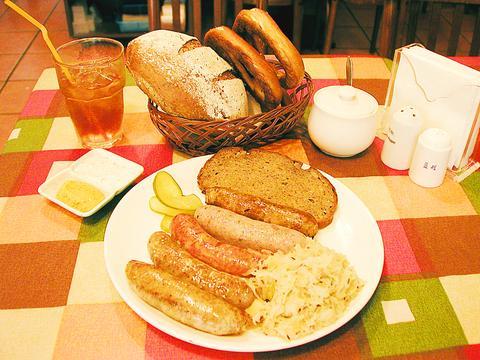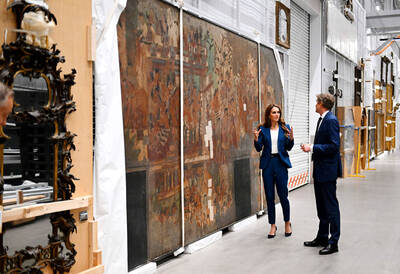In March, Taipei's two German restaurants called Schwarzwald -- one on Wenzhou Street, one on Yongkang Street -- parted ways and the Yongkang branch changed its name to Oma Ursel Cafe Restaurant and moved to Fuxing N Road, but retained its manager Chiu Dai-yu (邱岱玉) and the cooking staff, who have made it one of the few authentic German eateries in town over the past four years. The new name is a tribute to Chiu's German mother-in-law, whom she credits for teaching her everything she knows about German cuisine -- -- and one look at the menu will show that she's learned a huge amount.
Oma Ursel's tries to incorporate three elements of German food into its menu: home-style cooking of the kind taught by the restaurant's namesake, regional specialties and new flavors that have been incorporated into the national palette during recent decades. The result is a selection of dishes that is representative of current German cuisine without limiting itself to cliched Teutonic specialties.
Recently, Chiu has been enthusiastically promoting the restaurant's five choices of sausage, all of which are made on the premises. Less ambitious diners can choose two from among the bratwurst, cheese wurst, spicy wurst, white wurst and gyro wurst, or the brave can attempt all five. The stand-outs are the bratwurst and spicy wurst, while the gyro wurst in tatziki sauce is well worth a try to sample one of the flavors that Chiu said has become integral to German cuisine since the arrival of immigrants from Greece and Turkey.

PHOTO: MAX WOODWORTH, TAIPEI TIMES
Along with the sausages, diners eager for authentic fare should try the Wiener schnitzel, baked trout, or the chicken cordon bleu. This last dish is an absolute highlight, with plentiful cheese melted in the middle of the breaded, wrapped and fried chicken filet and pork. The cooks have deftly avoided over-breading to allow the flavors of the meat and cheese to come through while adding a pleasant crisp texture.
In the blazing summer months, when sausages and meats may be less appealing to some diners, the lighter fare on offer includes meal-size salads and a long list of vegetarian dishes, including the house's own vegetarian meatloaf, as well as light and low-priced lunch specials like spaetzle (fried homemade egg noodles) and seafood spaghetti. These go down especially well with a glass of Alsterwasser -- a half-and-half mix of beer and Sprite named for the lake in the center of Hamburg.
All of the restaurant's main dishes are served as set menus with decent portions of side orders that include sauerkraut, spaetzle, potato noodles or speck (braised potatoes, onions and bacon), salad, tomato and bacon soup, a slice of cake and coffee or tea. It's important to save space for the restaurant's homemade cakes, as no German meal would be complete without a slice, but you'll need the coffee (steer clear of the milk teas) or the remainder of your wheat beer to get down the apple tart, as it's quite dry.

One of the most important gripes that Taiwanese have about the Democratic Progressive Party (DPP) is that it has failed to deliver concretely on higher wages, housing prices and other bread-and-butter issues. The parallel complaint is that the DPP cares only about glamor issues, such as removing markers of Chinese Nationalist Party (KMT) colonialism by renaming them, or what the KMT codes as “de-Sinification.” Once again, as a critical election looms, the DPP is presenting evidence for that charge. The KMT was quick to jump on the recent proposal of the Ministry of the Interior (MOI) to rename roads that symbolize

On the evening of June 1, Control Yuan Secretary-General Lee Chun-yi (李俊俋) apologized and resigned in disgrace. His crime was instructing his driver to use a Control Yuan vehicle to transport his dog to a pet grooming salon. The Control Yuan is the government branch that investigates, audits and impeaches government officials for, among other things, misuse of government funds, so his misuse of a government vehicle was highly inappropriate. If this story were told to anyone living in the golden era of swaggering gangsters, flashy nouveau riche businessmen, and corrupt “black gold” politics of the 1980s and 1990s, they would have laughed.

It was just before 6am on a sunny November morning and I could hardly contain my excitement as I arrived at the wharf where I would catch the boat to one of Penghu’s most difficult-to-access islands, a trip that had been on my list for nearly a decade. Little did I know, my dream would soon be crushed. Unsure about which boat was heading to Huayu (花嶼), I found someone who appeared to be a local and asked if this was the right place to wait. “Oh, the boat to Huayu’s been canceled today,” she told me. I couldn’t believe my ears. Surely,

Imagine being able to visit a museum and examine up close thousand-year-old pottery, revel alone in jewelry from centuries past, or peer inside a Versace bag. Now London’s V&A has launched a revolutionary new exhibition space, where visitors can choose from some 250,000 objects, order something they want to spend time looking at and have it delivered to a room for a private viewing. Most museums have thousands of precious and historic items hidden away in their stores, which the public never gets to see or enjoy. But the V&A Storehouse, which opened on May 31 in a converted warehouse, has come up